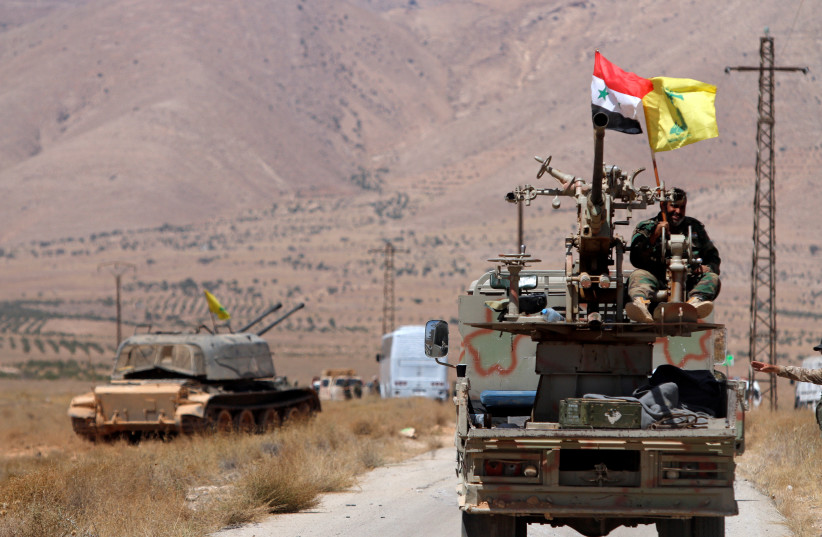An Israeli strike from the direction of the Golan Heights targeted a Hezbollah intelligence site south of Damascus, the IDF confirmed on Monday.
The head of the intelligence branch, Mahmoud Mohammed Shaheen, was killed in the strike. He assumed the position in 2007, fostering relations with Syrian-regime and Iranian-aligned officials, and led intelligence and air defense capabilities.
The IDF said the Syrian unit was operated directly by Hussein Ali Hazimeh, Hezbollah’s head of intelligence, who was killed along with Hashem Safieddine, the man originally tapped to lead the group after the assassination of Hassan Nasrallah, in a strike on Beirut last month.
Syrian and Western intelligence sources say Israeli attacks in Syria have killed numerous Hezbollah and pro-Iranian militia fighters based around the eastern outskirts of Damascus and to the south of the city.
The sources say the area remains a target due to the presence of high-ranking militia leaders.

Israel has been carrying out strikes against Iran-linked targets in Syria for years. It has ramped up strikes since the Hamas massacre on October 7, 2023 and particularly since the recent escalation of the Israel-Hezbollah conflict.
In southern Lebanon, the Israel Air Force killed Hezbollah’s Radwan Force’s anti-tank missile system commander, Riad Rida Ghazzawi, in an airstrike on the Sultaniyeh area, the IDF said.
Ghazzawi planned and executed many attacks on Israel, including firing anti-tank missiles at Israelis and soldiers operating in southern Lebanon, the army said.
In a separate strike, the IAF hit Hezbollah infrastructure in Safad El Battikh in southern Lebanon, including buildings in which a Hezbollah Command Unit terrorist operated, responsible for smuggling weapons to terror cells and rehabilitating terror operations in the Bint Jbeil area, according to the military.
Concurrently, soldiers have been operating in wooded, thicketed terrain in southern Lebanon along Israel’s border fence to uncover and dismantle Hezbollah infrastructure, the IDF said.
Combat engineering teams in Brigade 188 have been working to uncover and destroy terror infrastructure, including military buildings and weaponry.
Earlier on Monday, about 30 rockets were launched from Lebanon toward the Upper Galilee at 11 a.m.
Before this salvo, the IDF struck a rocket launcher from which another 30 rockets were launched toward the Upper Galilee at 9:25 a.m. During the barrages, the rockets were either intercepted or fell in open areas.
Terrorists eliminated
The IDF said it killed Palestinian Islamic Jihad terrorist Ahmed al-Dalu, who took part in the October 7 massacre in Kfar Aza, as well as Abu Ali Rida, a Hezbollah commander, the military said.
Throughout the war, Dalu was reportedly involved in the planning of terrorist activities against Israelis. He was killed in a targeted strike in the Gaza Strip directed by the Shin Bet (Israel Security Agency) and IDF ground troops, the military noted, adding that another terrorist was eliminated with him.
In Gaza, ground troops of the 162nd and 252nd divisions killed numerous terrorists in close-quarters combat and via aircraft fire. Troops also operated and killed fighters in the Rafah area.
Palestinian medics said seven Palestinians were killed in strikes on two separate homes in Beit Lahiya on Monday, five in central and southern Gaza.
The military said a combat soldier serving in the Givati Brigade was seriously wounded in combat in the northern Gaza Strip.
Germany on Monday called on Israel to let more humanitarian aid into northern Gaza, where a lack of supplies has led to a “desperate” and “unbearable” situation, a spokesperson for the German Foreign Ministry said on Monday.
“We call on the Israeli government urgently to meet its responsibilities under international law,” the spokesperson said. “Israel has the right to self-defense against Hamas within the framework of humanitarian international law.”
The IDF, through the Coordinator of Government Activities in the Territories (COGAT), has been intensifying efforts to vaccinate Gaza’s children against polio, it said.
In partnership with the World Health Organization and UNICEF, the campaign aims to vaccinate “hundreds of thousands of children in the Gaza Strip,” according to a statement by COGAT.
On Sunday alone, 35,827 people received the vaccine, bringing the total number of vaccinated individuals in northern Gaza to 94,431. Once the regional vaccination drive concludes, a situation assessment will determine “whether there is a need to extend the timeline,” COGAT noted.
